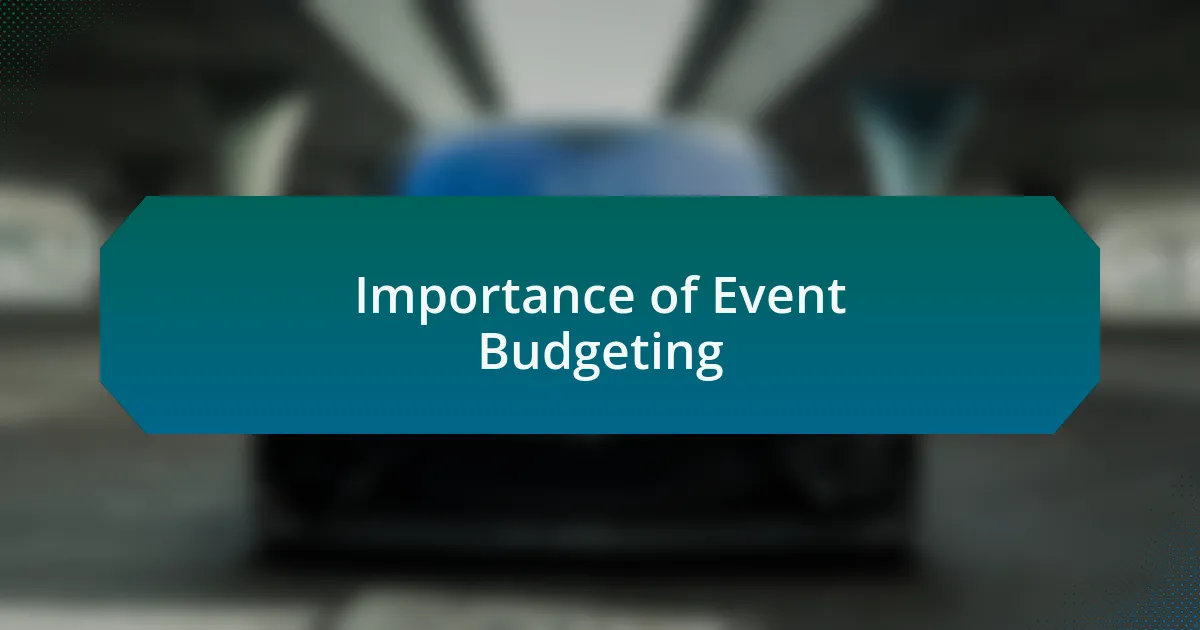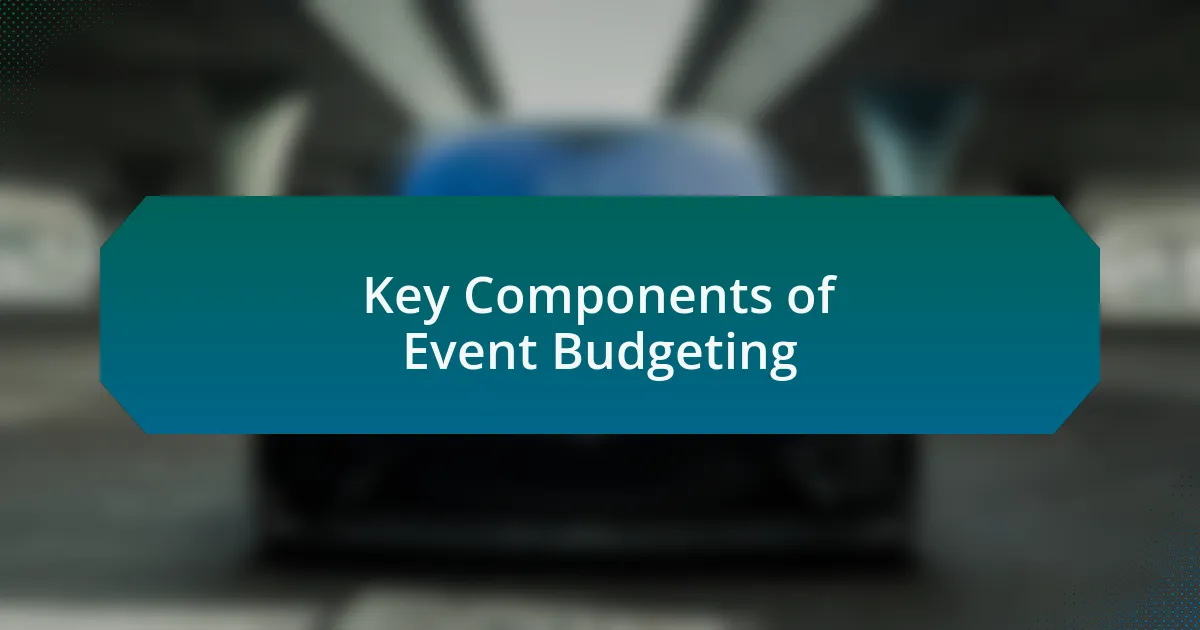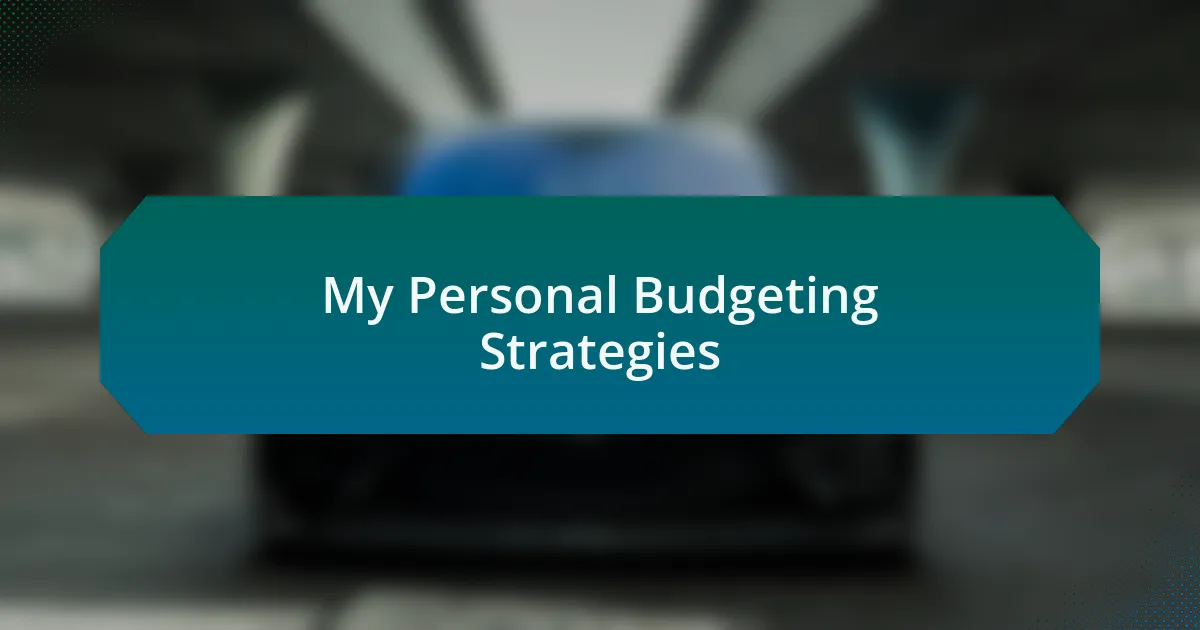Key takeaways:
- Event budgeting involves careful planning of financial resources for all aspects, ensuring alignment between expenses and the desired guest experience.
- Effective budgeting enhances clarity and accountability within the team, fostering collaboration and innovation in cost management.
- Key components include itemizing expenses, evaluating potential income and sponsorships, and analyzing return on investment (ROI) for future improvements.
- Setting priorities and having contingency plans are crucial for luxury car events, allowing for flexibility and better guest experiences despite unexpected challenges.

What is Event Budgeting
Event budgeting is essentially the process of planning and allocating financial resources for every aspect of an event. I remember the first major car show I organized; I underestimated the costs of venue rental and logistics. This taught me that every detail, from catering to security, must be thoughtfully accounted for to ensure a successful gathering.
At its core, event budgeting requires a clear understanding of your goals and expectations. Have you ever wondered why some events feel more polished than others? Often, it’s down to meticulous budgeting, where every line item plays a role in the overall experience, aligning expenditures with the desired impact on guests.
When I work on a new budget, I find it helpful to categorize expenses into fixed and variable costs. This distinction helps me track where I can save without compromising the quality of the event. For instance, while I might splurge on showcasing a luxury vehicle, I often opt for more budget-friendly options for décor, striking a balance that elevates the event without breaking the bank.

Importance of Event Budgeting
Effective event budgeting is crucial in ensuring that every dollar serves a purpose. I recall a time when I managed a launch event for a luxury sports car. The tight budget required constant adjustments and prioritization, and I learned firsthand how every expenditure can either enhance or detract from the event’s prestige. Have you ever seen a grand unveiling fall flat due to financial oversight? It’s a harsh reality that meticulous budgeting can prevent.
Another aspect of budgeting that often goes overlooked is the flexibility it provides. I remember planning for unexpected expenses, like last-minute venue changes. Anticipating these possibilities and allocating a contingency fund not only relieved my stress but also ensured the event maintained its upscale allure despite the hiccup. Wouldn’t you agree that such preparation not only protects the investment but also enhances the attendees’ experience?
Moreover, a well-structured budget fosters clarity and accountability among the team. When I share the budget breakdown with my colleagues, I observe how it encourages collaboration and innovation in finding ways to optimize costs. Have you considered how transparent budgeting can inspire creativity? By inviting input, I foster an environment where team members feel empowered to contribute, ensuring the event is not just successful, but memorable for all the right reasons.

Key Components of Event Budgeting
Understanding the key components of event budgeting is crucial for success. First and foremost, itemizing expenses is essential. During one of my earlier events, I learned the hard way how a simple oversight in catering costs could spiral out of control. By creating a detailed list, I was able to track every line item, ensuring each aspect aligned with the luxurious experience we were aiming for. Isn’t it fascinating how a clear view of costs can illuminate areas where you can splurge or save?
Another vital element is estimating income and sponsorships. I vividly recall negotiating with a local luxury retailer for sponsorship at an event. This partnership not only offset costs but also added an exclusive touch to the experience. It made me realize how vital it is to identify potential revenue streams early in the planning process. Have you ever wondered how collaborations can elevate an event while maintaining budget balance?
Lastly, evaluating the return on investment (ROI) is fundamental. After a high-profile launch, I spent time analyzing attendee feedback and sales leads generated. The data provided clarity on what worked and what didn’t, aiding future events. It was a rewarding moment of reflection. Can you think of a time when understanding the ROI changed your perspective on an investment? This analysis not only refines budgeting decisions but also enhances future planning, ultimately driving success in luxury events.

Budgeting for Luxury Car Events
When budgeting for luxury car events, setting priorities becomes paramount. I recall one unforgettable gala where we allocated a significant portion of the budget to venue decor. The transformation was stunning, but it taught me the importance of making strategic choices. How do you decide which elements of an event deserve more financial attention? Personal experience has shown me that it’s about striking a balance between aesthetic appeal and overall guest experience.
Another aspect I’ve found crucial is contingency planning. During a recent car exhibition, unexpected weather threatened to derail our outdoor activities. Fortunately, having a flexible budget that accounted for unforeseen expenses allowed us to pivot quickly. Can you imagine the chaos if we hadn’t set aside those extra funds? Being prepared for surprises not only safeguards your event but also provides peace of mind, enabling you to focus on creating memorable moments.
Lastly, don’t underestimate the power of post-event evaluations. After one particularly lavish showcase, I sought feedback from guests about their experience, from the cars displayed to the overall ambiance. I discovered that certain elements can overextend a budget and still fall flat. This insight was invaluable; how often do we miss an opportunity for improvement? Embracing constructive criticism fuels smarter budgeting choices for future luxury car events, ensuring we continually elevate the attendee experience.

Factors Affecting Luxury Car Budgets
When considering luxury car budgets, a key factor is the target audience. I remember an exclusive private viewing I hosted, where aligning our budget with the tastes and preferences of high-net-worth individuals was essential. Choosing premium catering and lavish entertainment drew praise, but it also taught me that overestimating what guests truly desire can inflate costs unnecessarily. How well do you know your audience?
Another aspect that weighs heavily on budgets is the choice of venue. For instance, in my experience, a high-end hotel with a stunning view can command steep rental fees. I once opted for a more understated space to allocate funds toward top-tier vehicles and exceptional customer service instead. This experience underscored a lesson: the ambiance should enhance the luxury experience without compromising your budget.
Lastly, consider the impact of partnerships and sponsorships. During a recent event, I collaborated with a luxury brand that provided items for a raffle. This partnership not only elevated the event’s profile but significantly offset costs. Have you ever thought about how leveraging relationships could reshape your budget? It’s an avenue worth exploring for a more flexible financial plan.

My Personal Budgeting Strategies
One of my core strategies for budgeting is setting priorities based on the impact they have on the overall guest experience. For example, during one of my events, I allocated a significant portion of my budget to interactive displays showcasing luxury cars rather than spending excessively on floral arrangements. This decision not only enhanced the attendees’ engagement but also created lasting impressions. Have you noticed how sometimes it’s the unexpected details that elevate an event?
Another approach I find effective is creating flexible budget categories. I remember when I organized an unveiling event—planning for contingencies helped me manage sudden expenses. When an unexpected guest speaker became available, I shifted funds from other areas, proving that having that room to maneuver can turn a good event into a great one. Have you ever had to pivot like that? It can be daunting, but it’s also a chance for creativity.
Lastly, I often draw on historical data to inform my budgeting decisions. Reflecting on past events, I analyze what worked well and where I overspent. In one instance, a meticulously tracked budget allowed me to identify that while lavish swag bags impressed attendees initially, they often got left behind. By learning from those moments, I consistently adjust my strategy, ensuring that my budget aligns with not just expectations, but reality. How about you—do you actively revisit past budgets to refine your future plans?